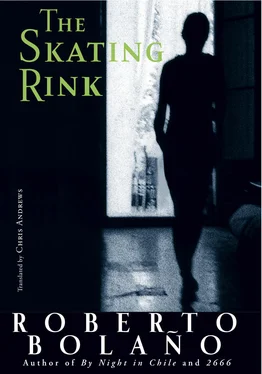Roberto Bolano - The Skating Rink
Здесь есть возможность читать онлайн «Roberto Bolano - The Skating Rink» весь текст электронной книги совершенно бесплатно (целиком полную версию без сокращений). В некоторых случаях можно слушать аудио, скачать через торрент в формате fb2 и присутствует краткое содержание. Год выпуска: 2009, Издательство: New Directions, Жанр: Современная проза, на английском языке. Описание произведения, (предисловие) а так же отзывы посетителей доступны на портале библиотеки ЛибКат.
- Название:The Skating Rink
- Автор:
- Издательство:New Directions
- Жанр:
- Год:2009
- ISBN:нет данных
- Рейтинг книги:5 / 5. Голосов: 1
-
Избранное:Добавить в избранное
- Отзывы:
-
Ваша оценка:
- 100
- 1
- 2
- 3
- 4
- 5
The Skating Rink: краткое содержание, описание и аннотация
Предлагаем к чтению аннотацию, описание, краткое содержание или предисловие (зависит от того, что написал сам автор книги «The Skating Rink»). Если вы не нашли необходимую информацию о книге — напишите в комментариях, мы постараемся отыскать её.
oscillates between two poles: a camp ground and a ruined mansion, the Palacio Benvingut. The story, told by three male narrators, revolves around a beautiful figure skating champion, Nuria Martí. When she is suddenly dropped from the Olympic team, a pompous but besotted civil servant secretly builds a skating rink in the ruined Palacio Benvingut, using public funds. But Nuria has affairs, provokes jealousy, and the skating rink becomes a crime scene. A mysterious pair of women, an ex-opera singer and a taciturn girl often armed with a knife, turn up as well.
A complex book,
’s short chapters are skillfully broken off with questions to maintain the narrative tension:
All of these questions are answered, and yet
is not fundamentally a crime novel, or not exclusively; it’s also about political corruption, sex, the experience of immigration, and frustrated passion. And it’s an atmospheric chronicle of one summer season in a seaside town, with its vacationers, its drifters, its businessmen, bureaucrats and social workers.
The Skating Rink — читать онлайн бесплатно полную книгу (весь текст) целиком
Ниже представлен текст книги, разбитый по страницам. Система сохранения места последней прочитанной страницы, позволяет с удобством читать онлайн бесплатно книгу «The Skating Rink», без необходимости каждый раз заново искать на чём Вы остановились. Поставьте закладку, и сможете в любой момент перейти на страницу, на которой закончили чтение.
Интервал:
Закладка:
Gaspar Heredia:
The music was the “Fire Dance”
The music was the “Fire Dance,” by Manuel de Falla, and I could see the skater’s torso moving in time with it as she lifted her arms, doing a clumsy yet somehow affecting imitation of a devotee offering a gift to a tiny invisible deity. The rest — the ice, the girl’s legs, her silver skates — were mainly hidden by piles of packing cases left there to block the way and make the place look like an amphitheater when viewed from the rink, although as I made my way around them, they seemed to form something more like a miniature labyrinth. For a start all I could see was the girl’s back, her arms curved in an ethereal embrace and the spotlights shining onto the ice, which reminded me of the lights around a boxing ring in Tijuana. The floor was made of cement, sloping down slightly towards the center, and the walls had been built on a foundation of irregularly shaped rocks, black with smoke. I threaded my way among the packing cases, some of which still had the dispatch documents on them, until I could find a better observation post. At the edge of the illuminated area, a fat guy was sitting on a multicolored beach chair, busily reading documents and annotating them with a felt-tip pen; at his feet was a cassette player, with the volume turned up, broadcasting the notes of the “Fire Dance” to every corner of the shed. The fat guy seemed very absorbed in what he was doing, although from time to time he looked up at the skater. The spotlights revealed something that intensified my bewilderment: in one corner of the rink was a ladder going down through the ice, and tangled around the ladder was a bunch of colored cables, which also went down through the bluish-white layer on which the curious skater was executing her figures. In spite of the cold I felt drops of sweat running down my face. Suddenly, the fat guy said something. The girl went on skating, oblivious. The fat guy spoke again, at greater length this time, and the girl, who was skating backwards now, replied with a curt sentence, as if what he had said didn’t concern her. Partly because they were speaking Catalan and partly because I was very nervous, I couldn’t understand what they were saying, but I felt as if I was inside a cave. The skater started practicing little jumps and kneeling moves; then the fat guy’s shadow emerged from the darkness and approached the edge of the rink. There he stood still with his hands in his pockets, his remarkably round head turning slowly, as he followed the girl with his shining, intent, unblinking eyes. There was something disturbing about that odd couple — the girl all grace and speed, the bottom-heavy man like a lead-weighted doll — but watching them I also felt a kind of silent fierce joy, which helped me not to lose my nerve and run away. I knew that they couldn’t see me, and that Caridad was somewhere around, so I settled down to wait as long as it would take. The skater began to turn on the spot, in the middle of rink, spinning faster and faster. With her chin up, her legs together and her back curved, she looked at first like an elegant spinning top. All at once, just as the fat guy and I were both, I presume, expecting the routine to end, she shot away toward the edge of the rink, in a move that although perfectly controlled seemed to owe more to luck than to training. The fat guy clapped. Marvelous, marvelous, he said in Catalan. I can understand words like that ( meravellós ). The skater went round the rink twice more before stopping in front of the fat guy, who was waiting with a towel. Then I heard the cassette player clicking off and the fat guy went back into the semidarkness and turned around while the skater got changed. In fact all she did was put on a tracksuit over her leotard, but nevertheless, he kept his gaze chastely averted. After putting her skates in a sports bag, the skater said something I didn’t catch. Her voice was like velvet. The fat guy turned around and, as if measuring his steps, approached the brightly lit sector. How was it? she asked, looking down, in a different tone of voice. Marvelous. You don’t think it was too slow? No, not for me, but if you think so. . They were both smiling, but in very different ways. The girl sighed. I’m exhausted, she said. Will you take me home? Of course, stuttered the fat guy, his lips curved in a shy smile. Wait for me in the passage, I’ll go and turn off the lights. The girl left without saying a word. The fat guy went behind a pile of cases and moments later the whole rink was plunged in complete darkness. He appeared again finding his way with a flashlight, and went out. I heard them go up the stairs. What do I do now, I wondered. There were some dim points of light above me. The moon shining through holes in the roof? Disoriented fireflies more likely. It was only then that I noticed the sound of a generator operating at full capacity somewhere in the mansion. To keep the ice frozen? Still confused about what I was doing there, I sat down on the freezing ground, leaned against a case and tried to think straight. But I couldn’t. A different noise, not the generator, put me on my guard. Someone lit a match at the edge of the rink and shadows immediately began to dance on the walls of the storehouse. I got up and looked at the rink, which was like a mirror now: Caridad was standing there with the lit match in one hand and the knife in the other. Luckily the match soon went out and the return of darkness reassured me. She had probably hidden in one of the rooms until then and come to check that the skater and the fat guy were gone. She was a trespasser in that warren of a house, like me. When she lit the second match I realized she was on the lookout, and I felt bad about staying in my hiding place, but I was worried that my sudden appearance might frighten her and make things worse. My decision not to reveal myself was also influenced the color of the knife-blade, which matched the color of the ice. After faltering repeatedly, the second match went out, but this time there was no interval of darkness; she lit another straight away and, as if succumbing to an attack of vertigo, stepped back suddenly, away from the edge of the rink. The third match soon went out, and its death was accompanied by a sigh. Only once had I ever heard anyone sigh like that: a hard, harsh sigh, alive in every hair, and the mere memory of it made me feel ill. I squatted between the cases until all I could hear was the generator and my own uneven breathing. I chose not to move for a long time. When I noticed that one of my legs was becoming seriously numb, I began the retreat; it was all I could do not to panic and go running down the mansion’s twisting corridors. Surprisingly I found my way without the slightest difficulty. The front door was locked. I jumped out a window. Once in the garden, I didn’t even try to open the iron gate; without a second thought I scaled the wall as if my life depended on it. .
Enric Rosquelles:
We started training at the beginning of summer
We started training at the beginning of summer. Sorry, Nuria started training at the beginning of summer, and we both thought that if she worked hard in July, August and September, she would triumph at the national trials, to be held some time in October in Madrid. No matter how corrupt the trainers, judges and administrators, Nuria’s virtuosity or finesse or whatever you like to call it, consolidated or perfected during those months of training, was bound to leave them speechless, and they’d have no choice but to let her back on the Olympic team, which was going to Budapest in November, if I’m not mistaken, for the annual European Figure Skating Competition. To be frank, the prospect of not seeing Nuria for at least two months (October would be spent training intensively in Madrid, then November in Budapest) was heartbreaking. Of course I was careful not to let it show. There was also the possibility that in October she would be dropped from the team for good, but I preferred not to think about that, because I knew what a blow it would be to her, and I had no idea how she would react. I didn’t want them to drop her, I swear! All I wanted was for her to be happy! That was the reason the rink had been built, so she would be able to train properly and get back on the team. With hindsight, I realize I should have hired a trainer, at least, but even if I had thought of it at the time, how could I have justified employing someone with qualifications like that? And where would I have found such a person? In summer, there’s a surplus of English teachers, but not of figure-skating trainers. On one occasion, if I remember rightly, Nuria mentioned an exiled Pole, a young guy, whose contract with the Catalan Federation had been cancelled after six months because of a breach of professional ethics. What had he done? Nuria didn’t know, nor did she care. I confess that I imagined him having sex with, or perhaps raping, a skater, female or male, in a dressing room. Assuming the worst, as usual. In any case, the Pole was hanging around in Barcelona, and we could have sought him out, but neither of us had time, or felt like it, so we soon gave up on the idea. I don’t know why, but lying awake recently, I’ve started thinking about that Pole. Although we never met, and never will, I feel very close to him, almost as if he were a friend. Perhaps because in a way I took on the trainer’s role, and although I could never remember the names of the different moves and routines, overall, I don’t think I was too bad. As a trainer, I mean, or the next best thing, a father figure most of the time. I knew how to listen, how to encourage her to persist when she was succumbing to laziness or fatigue; I knew how to inject a certain dose of method and discipline into our daily sessions. I took care of all the bothersome, peripheral tasks, so she could concentrate one hundred percent on skating. And it was my commitment to perfection (whatever the field or the task, I have always been a perfectionist) that led me to make a discovery, or a series of small discoveries, which taken together turned out to be extremely disturbing. At the start, I tried to tell myself they were illusions produced by nervous tension, although deep down I knew that I had never been less tense. Let me explain how it happened. Sometimes I got to the palace quite a long time before Nuria, and after putting on a canvas apron that I kept for odd jobs, I would set about checking the refrigeration equipment and the state of the ice. Sometimes I did a bit of sweeping, too. In one room I kept bleach, hydrochloric acid, a pair of brooms, trash bags, gloves, rags, as well as various tools. Occasionally I put a bottle with freshly picked wildflowers in the place where Nuria changed. I cleaned the heads of the cassette player with alcohol every day and made sure to rewind the cassette to the beginning of the “Fire Dance.” Sometimes, if I had time to spare, I went out to the back of the house and swept the steps that led to the cove, in case Nuria wanted to go down to the beach, before or after training. There was, in short, always something to be done, and if, as a rule, I left most of the palace’s rooms alone, my tidying took me to a fair part of the first and second floors, as well as the storehouse, the arbor, the sunken garden, and the gardens facing the sea. I knew those places like the back of my hand. So I was surprised to find little things, almost always pieces of trash, in places I was sure I had cleaned the previous day. Naturally my first reaction was to suspect the pair of good-for-nothings who worked for me there in the mornings, and one day I decided to take them to task. I wasn’t too hard on them — I was in a hurry — but hard enough to make them think twice next time. What sort of things did I find? Scraps that ranged from hamburger remains to empty Fortuna packs (but one of the guys smoked Ducados and the other one had kicked the habit). That was all. Insignificant things, but they shouldn’t have been there. One afternoon I found a bloody tissue. I picked it up, disgusted, as if it were a moribund rat, still twitching and sniffing, and threw it in the trash. Gradually I reached the conclusion that there was somebody else in the Palacio Benvingut. For three days I was on the verge of insanity. I kept thinking about Kubrick’s The Shining ; I had seen it on video at Nuria’s place not long before, and my nerves were still on edge. I tried to be objective and look for logical explanations, but then, having failed to find any, I decided to face up to the problem and search the palace from top to bottom. I devoted a whole morning to the task. I found nothing, not a shred of evidence to suggest that intruders had been present. Gradually I calmed down again, reassured by the absence of fresh trash over the following days. Naturally I said nothing to Nuria and I ended up convincing myself that it had all been a figment of my fevered imagination. .
Читать дальшеИнтервал:
Закладка:
Похожие книги на «The Skating Rink»
Представляем Вашему вниманию похожие книги на «The Skating Rink» списком для выбора. Мы отобрали схожую по названию и смыслу литературу в надежде предоставить читателям больше вариантов отыскать новые, интересные, ещё непрочитанные произведения.
Обсуждение, отзывы о книге «The Skating Rink» и просто собственные мнения читателей. Оставьте ваши комментарии, напишите, что Вы думаете о произведении, его смысле или главных героях. Укажите что конкретно понравилось, а что нет, и почему Вы так считаете.












